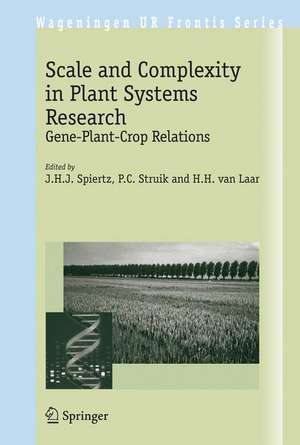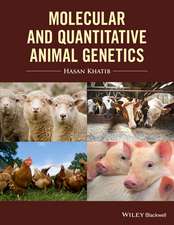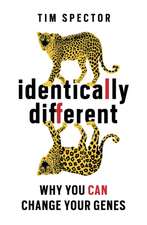Scale and Complexity in Plant Systems Research: Gene-Plant-Crop Relations: Wageningen UR Frontis Series, cartea 21
Editat de J.H.J. Spiertz, P.C. Struik, H. H. Van Laaren Limba Engleză Paperback – 11 mai 2007
| Toate formatele și edițiile | Preț | Express |
|---|---|---|
| Paperback (1) | 1045.91 lei 38-44 zile | |
| SPRINGER NETHERLANDS – 11 mai 2007 | 1045.91 lei 38-44 zile | |
| Hardback (1) | 1228.62 lei 6-8 săpt. | |
| SPRINGER NETHERLANDS – 24 apr 2007 | 1228.62 lei 6-8 săpt. |
Din seria Wageningen UR Frontis Series
- 15%
 Preț: 633.35 lei
Preț: 633.35 lei - 18%
 Preț: 940.72 lei
Preț: 940.72 lei - 18%
 Preț: 947.04 lei
Preț: 947.04 lei - 18%
 Preț: 1230.35 lei
Preț: 1230.35 lei - 18%
 Preț: 948.16 lei
Preț: 948.16 lei - 24%
 Preț: 1042.95 lei
Preț: 1042.95 lei - 18%
 Preț: 942.44 lei
Preț: 942.44 lei - 24%
 Preț: 1028.82 lei
Preț: 1028.82 lei - 24%
 Preț: 787.48 lei
Preț: 787.48 lei - 18%
 Preț: 946.55 lei
Preț: 946.55 lei - 24%
 Preț: 1035.77 lei
Preț: 1035.77 lei - 18%
 Preț: 944.06 lei
Preț: 944.06 lei - 18%
 Preț: 1213.34 lei
Preț: 1213.34 lei - 18%
 Preț: 1224.36 lei
Preț: 1224.36 lei - 18%
 Preț: 1218.83 lei
Preț: 1218.83 lei - 18%
 Preț: 1218.06 lei
Preț: 1218.06 lei - 18%
 Preț: 941.38 lei
Preț: 941.38 lei - 18%
 Preț: 938.66 lei
Preț: 938.66 lei - 15%
 Preț: 639.08 lei
Preț: 639.08 lei - 18%
 Preț: 941.68 lei
Preț: 941.68 lei - 24%
 Preț: 791.78 lei
Preț: 791.78 lei - 15%
 Preț: 639.59 lei
Preț: 639.59 lei -
 Preț: 380.63 lei
Preț: 380.63 lei - 15%
 Preț: 629.56 lei
Preț: 629.56 lei
Preț: 1045.91 lei
Preț vechi: 1376.19 lei
-24% Nou
Puncte Express: 1569
Preț estimativ în valută:
200.13€ • 209.52$ • 165.60£
200.13€ • 209.52$ • 165.60£
Carte tipărită la comandă
Livrare economică 03-09 aprilie
Preluare comenzi: 021 569.72.76
Specificații
ISBN-13: 9781402059056
ISBN-10: 1402059051
Pagini: 344
Ilustrații: X, 330 p.
Dimensiuni: 155 x 235 x 18 mm
Greutate: 0.58 kg
Ediția:2007
Editura: SPRINGER NETHERLANDS
Colecția Springer
Seria Wageningen UR Frontis Series
Locul publicării:Dordrecht, Netherlands
ISBN-10: 1402059051
Pagini: 344
Ilustrații: X, 330 p.
Dimensiuni: 155 x 235 x 18 mm
Greutate: 0.58 kg
Ediția:2007
Editura: SPRINGER NETHERLANDS
Colecția Springer
Seria Wageningen UR Frontis Series
Locul publicării:Dordrecht, Netherlands
Public țintă
ResearchCuprins
Genetics of plant performance: from molecular analysis to modelling.- Genetic and Molecular Analysis of Growth Responses to Environmental Factors Using Arabidopsis Thaliana Natural Variation.- From QTLS to Genes Controlling Root Traits in Maize.- Multi-Trait Multi-Environment QTL Modelling for Drought-Stress Adaptation in Maize.- Accounting for Variability in the Detection and Use of Markers for Simple and Complex Traits.- An Integrated Systems Approach to Crop Improvement.- Crop Systems Biology.- Modelling genotype × environment interactions.- A Modelling Approach To Genotype × Environment Interaction.- Modelling Genotype × Environment × Management Interactions to Improve Yield, Water Use Efficiency and Grain Protein in Wheat.- Physiological Processes to Understand Genotype × Environment Interactions in Maize Silking Dynamics.- Modelling the Genetic Basis of Response Curves Underlying Genotype × Environment Interaction.- Physiology and genetics of crop adaptation.- Physiological Interventions in Breeding for Adaptation to Abiotic Stress.- Physiological Traits for Improving Wheat Yield Under a Wide Range of Conditions.- Is Plant Growth Driven by Sink Regulation?.- Yield Improvement Associated with Lr19 Translocation in Wheat.- Physiology and modelling of crop adaptation.- Simulation Analysis of Physiological Traits to Improve Yield, Nitrogen Use Efficiency and Grain Protein Concentration in Wheat.- An Architectural Approach to Investigate Maize Response to Low Temperature.- Tillering in Spring Wheat.- Use of Crop Growth Models to Evaluate Physiological Traits in Genotypes of Horticultural Crops.- Diversity, resource use and crop performance.- Role of Root Clusters in Phosphorus Acquisition and Increasing Biological Diversity in Agriculture.- Prospects for GeneticImprovement to Increase Lowland Rice Yields with Less Water and Nitrogen.- Exploiting Diversity to Manage Weeds in Agro-Ecosystems.- Outlook and dialogue.- When can Intelligent Design of Crops by Humans Outperform Natural Selection?.- Integrated Assessment of Agricultural Systems at Multiple Scales.- A Dialogue on Interdisciplinary Collaboration to Bridge the Gap Between Plant Genomics and Crop Sciences.
Textul de pe ultima copertă
This book presents and discusses new directions in plant systems research to bridge knowledge from the gene to the plant, crop and agro-ecosystem levels and to assist in solving problems in production ecology and resource use by identifying and applying new research methods. Functional genomics, systems biology and ecophysiological modelling of crop growth and development provide powerful tools for identifying genes and genotypes of agronomic importance. Despite remarkable advances in basic knowledge of plant genes and gene networks, there has been relatively little impact on crop improvement from the application of genomics and recombinant-DNA technology. Novel directions in linking plant sciences to crop and systems research are needed to meet the growing demand for food in a sustainable way. The challenge is to produce more food on the limited available land through more efficient use of natural resources and external inputs.
Genetics of plant performance are discussed using examples of Arabidopsis thaliana and food crops. The concept of ‘crop system biology’ is introduced. Within the theme ‘physiology and genetics’ traits and mechanisms to improve crop adaptation are discussed. Furthermore, various approaches in modelling G x E interactions and crop performance are presented. Some chapters are dedicated to the role of diversity in optimizing resource use and crop performance. An outlook and dialogue on future directions in plant system research challenges readers with contrasting opinions on the way forward concerning this critical issue for the future of food production.
Genetics of plant performance are discussed using examples of Arabidopsis thaliana and food crops. The concept of ‘crop system biology’ is introduced. Within the theme ‘physiology and genetics’ traits and mechanisms to improve crop adaptation are discussed. Furthermore, various approaches in modelling G x E interactions and crop performance are presented. Some chapters are dedicated to the role of diversity in optimizing resource use and crop performance. An outlook and dialogue on future directions in plant system research challenges readers with contrasting opinions on the way forward concerning this critical issue for the future of food production.
Caracteristici
Presents genetics of plant performance: from genome to crop systems biology New insights in physiology and genetics of crop adaptation for wheat and maize Innovative approaches in architectural and physiology-based modelling of crop functioning Linking genetic and species diversity with resource use and crop performance Presents an outlook and dialogue on an agenda for future plant systems research











